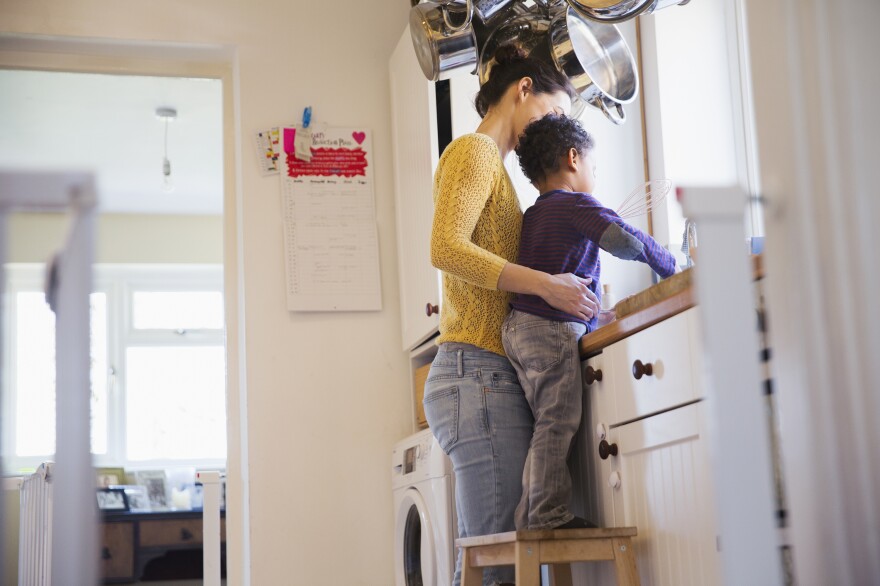Why does everyone end up in the kitchen at gatherings? Is it the smells? The warmth? The bottle of champagne chilling in the fridge, just begging to be popped?
Whatever it is (probably the champagne), the kitchen is the heart of the home for families of all kinds.
Journalist, writer and former host of All Things Considered, Michele Norris, is exploring the significance of the family kitchen in her new podcast, Your Mama's Kitchen.
Norris asks her guests like former first lady Michelle Obama, CBS Mornings host Gayle King and actor Matthew Broderick about their mother's kitchens — what they remember, what they learned there and what it means to them.
What is it? The family kitchen.
First, let's hear about the kitchen Norris grew up in:
- "Our kitchen was also the hub of life. It had a TV, had a little radio in there. She was always listening," Norris told All Things Considered. "She was one of the early adopters for public radio up there in Minnesota Public Radio. But also, my sisters would take control and then go to the end of the dial, and dance music would come on and we would dance in the kitchen."
- "My mama's kitchen was organized because Betty Norris is organized," Norris says. "It was delicious because Betty Norris is a great cook. And it was adventurous. My mom used cookbooks to explore worlds that otherwise weren't available to her."
Want more on food? Listen to the Consider This episode on how the hot dog eating contest became an American tradition.

What's cookin'?
In the podcast, former first lady Michelle Obama talks about how her family didn't have a lot of money and were careful about how much food they bought, but despite that the kitchen was a warm and secure place.
- "They didn't consider themselves poor," Norris says of the former first lady's family. "That would not be a word that they applied to themselves. But her mother stayed at home, and her father worked in Chicago — a municipal employee. And they raised two kids in a little apartment above their relatives. And so their kitchen was basically a converted bedroom. But what was interesting in listening to her talk about that [was] particularly at the end of the podcast where you can hear her getting a little emotional."
- Here's how Obama described it on Norris' podcast: "That was the power of my parents' love — that consistency, the quality of the interactions. That's what it means to be a parent. That's how you instill something worthwhile for your kids."
- Writer Glennon Doyle and her wife, soccer star Abby Wambach, describe in the podcast the complicated meshing they've had to do in their own kitchen based on their childhoods. Wambach came from a big family where food was abundant; while Doyle's parents instilled a sense of scarcity and monitoring what everyone ate because they were concerned with physique.
- "Then [Doyle and Wambach] learn how to come together and build this beautiful life together," Norris says. "And that represents a lot of other issues in their life. That abundance and scarcity often deals with finance. It deals with how they deal with their time. So it's all this complicated stuff, but so many things in life come right back to the kitchen."
What do the kids have to say?
- Norris asked her own kids what they would say about their family kitchen. Norris says she was a little worried about it at first: "Because the kitchens are also where we pay bills, where we have arguments, where we fuss at our kids to do their homework, where we do crazy volcano projects at the kitchen table."
- "But I asked the kids, and dancing came up 'cause we do dance a lot in our kitchen," Norris says. "They talked about holidays. They talked about gumbo. And this is the thing that made me — my husband, Broderick, and I — smile a little bit: they talked about consistency. That they knew that the kitchen was consistently a warm space where we ate on a regular basis even while hosting this crazy show, you know? I'd careen home and have a quick meal with the kids and then a second meal with my husband later on where we really had time to eat. But I just wanted to sit at the table with them before they went to bed."
- And Norris' kitchen is funky. Not the food — the sounds: Stevie Wonder, Prince. So here's a sample if you'd like to imagine you're sitting at the table of a radio legend:
Copyright 2023 NPR. To see more, visit https://www.npr.org.






